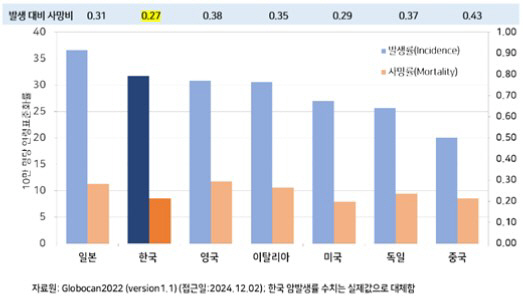Symptoms vary depending on the location of colorectal cancer...You may not be able to see blood excrement
Mar 31, 2025
|
Colorectal cancer is a malignant tumor that occurs in the large intestine, and genetic factors, lifestyle, diet, and environmental factors all play an important role in the occurrence of colorectal cancer.
|
Director Kim Jung-ki explained, `The colon is divided into colon and rectum, and colon cancer can have different symptoms depending on the location of the occurrence. Right colon cancer is a common symptom of pain in the right abdomen, weight loss, anemia, but blood stool may not be visible because bleeding does not get on the stool, and left colon cancer is likely to cause intestinal obstruction because the tumor can block the left side of the colon, and rectal cancer may have symptoms such as changes in bowel habits, bloody excrement, and anal pain.'
Early detection of colorectal cancer is very important because it can significantly increase the survival rate of patients. There are several test methods, and colonoscopy is the most effective and reliable test method to detect colorectal cancer early. Regular endoscopy can detect polyps or cancer precursors early, and the found polyps can be removed immediately. In addition, it is possible to check whether blood is contained in the stool through a fecal occult blood test, and colon cancer is diagnosed through colon CT and rectal resin tests.
Various methods are used to treat colorectal cancer depending on the stage of cancer, the patient's health condition, and the characteristics of cancer cells. In addition to existing surgery, radiation therapy, chemotherapy, immunotherapy, targeted therapy, and the latest radiation technology have greatly improved the effectiveness of colorectal cancer treatment.
Manager Kim Jung-ki said "Colon cancer surgery aims to remove cancer and maintain intestinal function as much as possible.These days, robotic surgical equipment allows accurate and precise resection of cancer areas even when high-level surgery is required or cancer is present in complex locations."
Chronic stress and sleep deprivation can reduce immune function and cause inflammation, increasing the risk of developing cancer, and abdominal obesity, in particular, is one of the factors that significantly increase the risk of developing colorectal cancer. It is important to prevent colorectal cancer through proper eating habits and healthy lifestyles and to detect colorectal cancer early through regular checkups.
|
This article was translated by Naver AI translator.
















